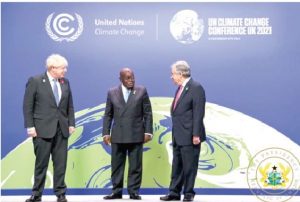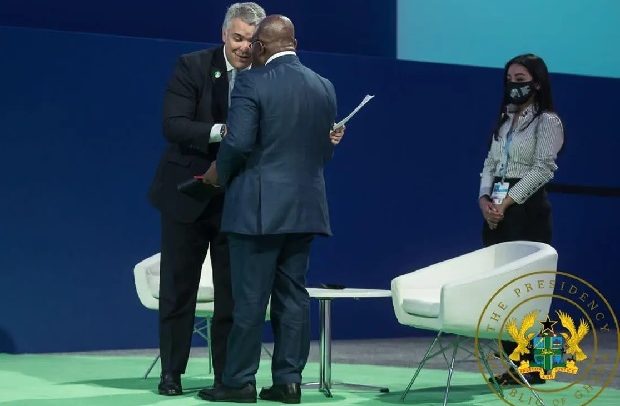President Akufo-Addo during the forum on Forests and Oceans
President of Akufo-Addo, yesterday, on the sidelines of the ongoing United Nations Climate Change Conference, COP26, in Glasgow, Scotland joined other world leaders to discuss the threats posed to forests and oceans.
The President said at the World Leader’s Summit on protecting the world’s forests and oceans, that Ghana has, in the course of the last two decades, adopted several policies and programmes, such as National Forest Plantation Development Programme and the Ghana Forest Plantation Strategy, aimed at restoring lost forest cover.
Describing deforestation and forest degradation as the “greatest challenges to sustainable forest management,” the President said that “in June this year, I led the entire country, through the Green Ghana Project, to plant over seven million trees, far above the five million we had targeted. Next year, we aim to plant a minimum of twenty million trees, and we have already begun earnest preparations towards this.”
He assured that “from 2024 and beyond, we aim to reduce emissions by some ten million tonnes of carbon dioxide equivalent in the cocoa-forest landscape, through the implementation of the Ghana Cocoa Forest REDD+ Programme, one of five ecological landscape-tailored programmes in Ghana’s REDD+ Strategy.”

He said that Ghana through the Nationally Determined Contributions in the forestry sector “is committed to supporting the global target of halving emissions by 2030, and attaining neutrality by 2050.”
Reiterating Ghana’s commitment to managing sustainable ocean management, as the historic Transformation Document that was launched in December last year, the President added that the country is putting in place the requisite structures and processes to finalise her Sustainable Ocean Plan by 2025.
“The pressing threats we face are marine security, due to the prevalence of piracy and armed robbery on our seas, the mounting menace of Illegal, Unregulated and Unreported fishing (IUU), overfishing and its attendant decline in fish stocks, and plastic pollution,” he said.
As Ghana deal with these challenges, in partnership with the United Nations Division for Ocean Affairs and Law of the Sea, “we are also conducting an Ocean Governance Study to help us strengthen our legal and institutional framework for ocean management,” he disclosed.
In addition, the President noted that to help reduce the excessive pressure, over-exploitation and to replenish Ghana’s falling marine fish stocks, just as was done last year, he told the gathering that Ghana has implemented a closed season for artisanal and industrial fishing.
“The results have been a phenomenal success, and we intend to continue to implement this policy with huge positive dividends over the medium-term. We must leverage our collective political influence, build strong partnerships with business leaders and influencers in civil society to drive effectively the implementation of the Transformations Document by all countries,” he added.


